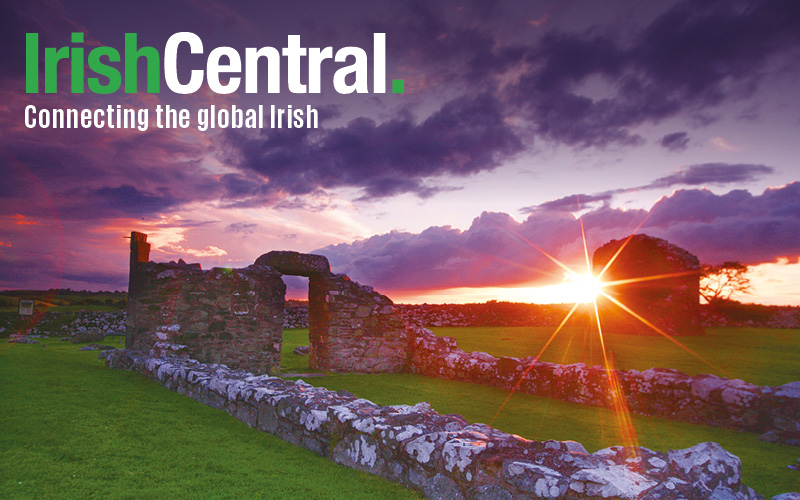| John F Kennedy greeted by crowds waving American flags in Ireland (Photo: JFK50Ireland) |
PHOTOS - John Fitzgerald Kennedy: A Life in Pictures
On November 25, 1963, John F. Kennedy’s young son was famously photographed saluting his father, as the president’s flag-draped coffin passed mourning family members as part of the somber funeral procession through Washington.
What is less well known is that November 25 was also young John F. Kennedy Jr.’s third birthday.
Until his own untimely death in 1999, with the approach of every birthday, JFK Jr. was forced to recall his own father’s violent passing on November 22, 1963, now 50 years ago.
Then again, that date is still so burned into the nation’s psyche that most Americans took note of the assassination anniversary every time late November rolled around.
Try this quiz. Ask anyone when JFK was assassinated and it’s a good bet they know the date.
Then ask when JFK was born. Good luck with that.
The glut of books, documentaries and other TV specials revolving around the 50th anniversary of JFK’s assassination have looked at the events and people linked with this tragedy from nearly every angle.
However, one important aspect of JFK’s death that has not been discussed much is just how distinctly Irish the somber proceedings were.
Over two dozen Irish Army cadets were invited by JFK’s grieving widow, Jackie Kennedy, to perform a drill that had so impressed Kennedy when he visited Ireland just a few months earlier, in June of 1963.
“How I envied you being in Ireland with him,” Jackie is said to have told Dave Powers and Kenny O’Donnell, advisers who were members of JFK’s so-called Irish Mafia.
Meanwhile, when the funeral procession left the White House, family members made sure that Irish music accompanied the president on his final journey, including “Come Back to Erin” and “The Boys of Wexford,” according to Thomas Maier’s excellent book The Kennedys: America’s Emerald Kings.
Perhaps the most interesting song played, however, was one set to words written by Boston Cardinal William O’Connell, entitled “The Cross and the Flag.”
When we think of great lyrics, we tend not to think of clergymen. But O’Connell is said to have written this angry song as a direct rebuke to anti-Irish and anti-Catholic bigots who proudly resurrected the Ku Klux Klan in the 1920s.
“Hail banner of our native land / Great ensign of the free / We love thy glorious stars and stripes / Emblem of liberty,” O’Connell wrote in one section of this song whose purpose was to refute the bigoted idea that Catholic immigrants could never be loyal to the U.S.
“Lift high the Cross / unfurl the flag / May they forever stand / United in our hearts and hopes / God and our native land.”
And if he did nothing else, John F. Kennedy -- the first “minority president” as Thomas Maier calls him -- finally did prove that Irish Catholics could be loyal Americans.
This was no small matter. Just six years before Kennedy’s election, best-selling author Paul Blanshard published a screed entitled The Irish and Catholic Power, which made the argument that foreigners in general and Irish Catholics in particular should not and could not be trusted by Americans. A few years earlier, Blanshard made the same arguments about Roman Catholics in his best seller American Freedom and Catholic Power.
So, for proving to bigots that the Irish could be loyal Americans (if not necessarily loyal husbands), we owe JFK a great debt.
What else is there to say about JFK 50 years after his assassination? Was he a great president? Hardly. For those who argue he would have realized his greatness in his second term, it’s just as likely things would have gone horribly wrong.
The fascination with JFK, and all the whacked-out assassination conspiracies, really says more about us as a nation. Life before November 22, 1963 was hardly a paradise. But the years that followed, the explosions in war and technology, paranoia and violence, truly were frightening.
Nostalgic visions of Camelot tend to soothe us. Also soothing -- oddly -- is the belief that vast powers must have been at work to topple this handsome king. But no, it was just a nut with a gun, as it usually is.
There is one more thing we should know about JFK. He was born on May 29, 1917.
PHOTOS - John Fitzgerald Kennedy: A Life in Pictures
(Contact “Sidewalks” at tdeignan.blogspot.com)




Comments